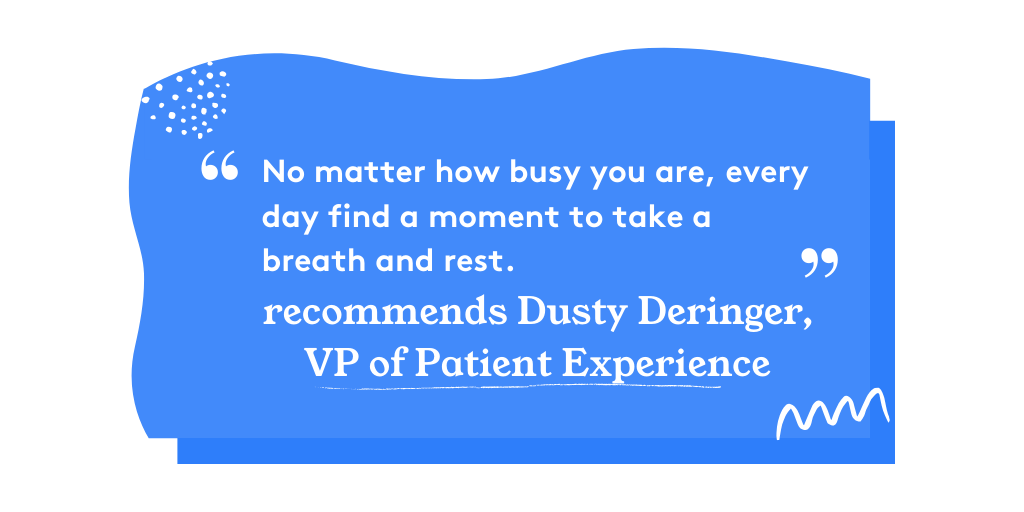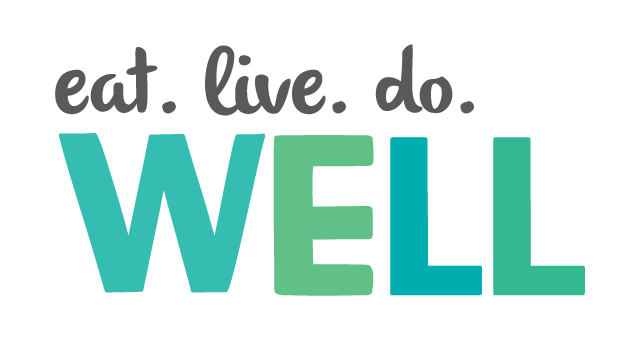Anxiety. We’ve all heard the term somewhere. Some of us might even be wondering if we’re experiencing some form of anxiety. Whether we are working from home to help flatten the curve or on the frontlines fighting the novel coronavirus, COVID-19, our world has changed and this new normal can bring feelings of worry and unease.

Before the COVID-19 outbreak, Dusty Deringer, Vice President of Patient Experience for Compass One Healthcare, traveled most of the week. But suddenly the travel stopped, and he began working from his home office every day of the week. He soon realized he had to adjust to this new normal and come up with ways to navigate the pandemic while supporting his team and our clients.
Besides being an expert in patient experience, Deringer is a business psychologist, so we asked him to share some strategies we can use to ease our anxiety and help our teams take care of their mental health during these trying times:
- Take care of yourself
If you’re working from home, it is essential to develop a routine. A routine that has worked for Deringer is to start early in the morning by checking emails and planning his day. He takes a couple of breaks throughout the day and ends his workday at a set time. “You need to know at what time your day starts and ends. You shouldn’t feel guilty that you’re not working all day. You need time to stop, take a breath, and recharge.”
- Eat right
Eating right sounds easy, but it’s not. When you’re working from home, you may find yourself eating more than usual or not getting all the nutrients you need to stay healthy. Katherine Basbaum, Clinical Dietitian for Morrison Healthcare at UVA Health, shared some food do’s and don’ts when trying to manage anxiety:
DON’T overdo it on “comfort foods” like sweets, starches, and packaged snacks. Yes, they can provide a calming effect, but it will always be short-lived with those quickly absorbed, refined carbohydrates.
DO focus on complex carbohydrates and lean protein. This combo will help your body create serotonin, the ultimate in calming, anxiety-busting hormones. Also, the effect will last longer, so you can avoid mood swings. Fortunately, even with limited pantry items, achieving a satisfying combo of complex carbs and protein shouldn’t be too difficult. Make a pot of beans or chili, thaw out and batch-cook some chicken breasts, hard-boil a few eggs, have a bowl of oatmeal in the morning, or enjoy a roasted sweet potato for lunch or dinner (or breakfast!).
DON’T overdo it on the caffeine. It may be tempting to increase caffeine intake to help get through the long, complicated days we now face in this new normal, but it can make anxiety worse so it’s best to go easy. Too much of this energy booster can cause jitteriness, which may heighten anxiety, and may cause difficulty sleeping.
DO make sure to get your omega-3’s. Research shows that getting a healthy dose of omega-3 fatty acids in your diet from fatty, cold-water fish can help with mood disorders such as depression and anxiety. This is due in part to the anti-inflammatory effects of omega-3s. Ideally, you should aim for three servings per week. For example, you could grill up some tuna melts on whole grain bread, toss some canned salmon into your next salad and grill a piece of trout or mackerel for your next dinner alongside green veggies and brown rice.
- Get enough rest
According to the National Heart, Lung, and Blood Institute, getting enough sleep can help protect your mental and physical health and quality of life. Although required hours of sleep vary, most healthy adults need between seven and nine hours of sleep per night to function at their best.
Easier said than done, you may be thinking. The National Sleep Foundation recommends sticking to a sleep schedule, practicing a relaxing bedtime ritual that separates you from activities that can cause stress or anxiety, and avoiding electronics before bed. So, don’t read that latest report on coronavirus cases in your state right before going to sleep!
- Do get some exercise
Make exercise a part of your routine. It doesn’t have to be anything complicated. A walk around your neighborhood, strolling up and down the stairs, or simple at-home workout videos can help you stay healthy and combat anxiety.

- Find some quiet time
“No matter how busy you are, every day find a moment to take a breath and rest,” recommends Deringer. If you like music, listen to a song that puts you in a good mood. Read a chapter of a book, close your eyes for a couple of minutes or meditate if that’s something that helps you relax.
How to ease anxiety on your team
For Deringer, supporting his team and coworkers through these difficult times has been crucial. “I know it’s not easy, but you have to talk about it. It’s important to open the lines of communication and make sure your team knows you are listening.”
Deringer explained that when talking to your team, you need to look for signs of stress: are they breathing heavily? Have they been responding to emails? Are they working long hours or facing financial pressure?
“As a leader, it’s essential that you identify stressors and talk about the issues. It’s an uncomfortable topic, but if you know what’s going on in their lives, you can help them,” said Deringer.
For more information on how to cope with stress and anxiety during the outbreak of coronavirus disease, visit the Centers for Disease Control and Prevention (CDC) website.
This post originally appeared on the Morrison Healthcare Blog.



Leave a Reply
You must be logged in to post a comment.